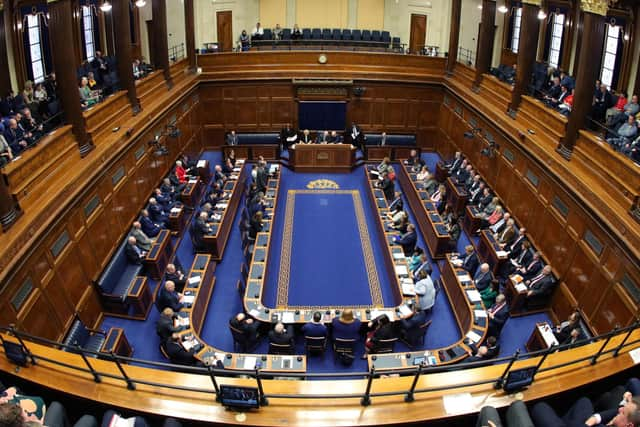Alex Kane: Stormont’s return is a huge opportunity, but with all the same old distractions


The next moment was May 8, 2007 when Ian Paisley and Martin McGuinness were elected first minister and deputy first minister and Paisley told an international audience in Stormont: “Today at long last we are starting upon the road – I emphasise starting – which I believe will take us to lasting peace in our Province.”
It was the beginning of the ‘Chuckle Brothers’ double-act and again there was a very real sense that something very different was happening, something that could nudge unionism and nationalism much closer together. That moment ended a year later when the DUP, fearing the grassroots reaction to the Ian/Martin love-in, dumped Paisley.
Advertisement
Hide AdAdvertisement
Hide AdWhile it’s true that devolution was maintained for most of the next decade it is now clear (and Martin McGuinness’s resignation letter in January 2017 confirmed it) that it was built upon mistrust and toxicity and interspersed with serial crises, standoffs, emergency interventions and occasional farces like the ‘rotating ministers’ saga. Most observers knew the whole process was operating on a wing-and-a-prayer basis, so it wasn’t really a surprise when the institutions collapsed three years ago.


So, does what happened between Thursday and Saturday constitute the sort of moment we are used to; in other words, will it soon become apparent that the breakthrough already contains all of the elements of an inevitable breakdown? My immediate reaction appeared in a tweet: ‘The most important thing now is that there is a huge opportunity for the incoming Executive to collectively make everyday life better for most people in so many ways, as well as instilling some much-needed confidence into Northern Ireland. I really hope the opportunity won’t be squandered.’
Now, while that sounds unusually optimistic for me, I stand over it. There is a huge opportunity. With 300,000 people on waiting lists for hospital appointments and treatments (and let’s not forget the families of all those people) there’s a huge opportunity to tackle that problem. Many, many schools (and let’s not forget each child has parents) need decisions made on funding and structure. Decisions can now be made on the economy.
Everywhere you look there are opportunities for this new Executive to make a real difference to the lives of hundreds-of-thousands of people. And in making that difference you begin the process of building the collective confidence and goodwill which makes it much easier when the more difficult political/constitutional issues will have to be addressed.
Advertisement
Hide AdAdvertisement
Hide AdWhat can’t be known at this point is whether the parties will return to their old squabbling, silo-mentality approach to government, which meant prioritising their own agenda above all else and running their departments as little more than off-shoots of their own policy/research/press offices. If that happens then the ‘moment’ will have come and gone in the blink of an eye and the unravelling process will begin again. When increasing numbers of people believe the government is not acting in their interest they are always more willing to listen to those – on both sides – who tell them they are being disadvantaged, left behind and stripped of their rights and identity by the champions of ‘themuns’.
It is already evident – because they have said so – that the parties don’t agree on all aspects of the agreement they’ve signed up to. That will be a problem. UUP sources have told me they won’t be supporting the legacy proposals or language commissioners. Michelle O’Neill says: “There is no contradiction in power-sharing with unionism and also initiating a conversation on the constitutional future of Ireland beyond Brexit. I would encourage unionists and all sections of society to engage fully in the conversation on the constitutional future of our island.”
The DUP will have problems – some of it internal – when the Irish language proposals reach the legislation phase. Alliance won’t want to be in a position of being stuck and squeezed between the DUP and SF. And the SDLP has warned that it won’t be taken for granted on a range of issues.
Moments depend on momentum; that perception of people, parties and policies on the same page and headed in the same direction. I was struck by the lack of hoopla, excitement and interest which accompanied the deal and the rebooting of the Assembly. Goodwill towards our politicians is at a very low ebb. As one person summed it up to me yesterday afternoon: “They think we should be grateful to them for getting off their arses, increasing their salaries again and getting back to the job we’ve being paying them to do for three years. Anyway, the countdown to the next bun fight over something probably started when Foster and O’Neill sat down on opposite sides of the chamber yesterday.”
Advertisement
Hide AdAdvertisement
Hide AdThat’s what the politicians need to focus on. There is no sense of gratitude from the public right now, so the parties need to accept that their biggest task is instilling confidence. Every single in-tray contains a mountain of problems. They will be nowhere close to resolving most of those problems when the present mandate runs out in May 2022. Along the way some very unpopular decisions will have to be made and the Executive must take collective responsibility for the unpopular as well as the popular. And, much sooner than they think, there will be new caps on public spending.
The biggest problem of all, though, is that the same-old, same-old distractions (the us-and-them variety) will raise their heads very quickly. How the Executive responds to those will determine how long this latest moment lasts. With all the obvious difficulties I still think it’s worth giving this moment a fair wind. That said, the parties need to play fair with us, too.